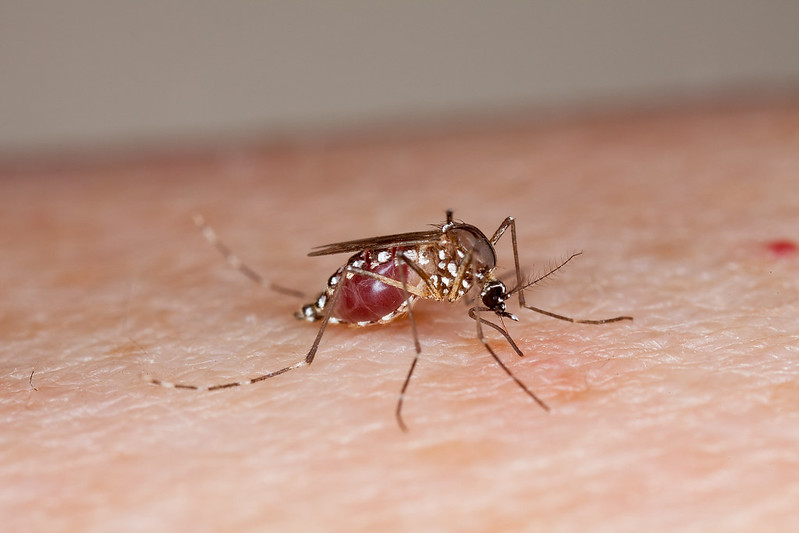Controlling Insect Pests to Protect Plant, Animal, and Human Health
ARS collaborates across the human, animal, and environmental health communities to achieve sustained health outcomes for plants, animals, and people. Research at ARS informs and provides solutions to improve the U.S. biodefense posture and encompasses animal health; medical, veterinary, and urban entomology; plant health; and natural resources and sustainable agricultural systems. The rapid evolution of insecticide resistance in insect pest populations can make chemical controls unsustainable, so alternative and effective management strategies for these insect pests are needed. The following
accomplishments in 2021 illustrate ARS efforts to eliminate insect vectors of disease, those that feed on crops, and nullify their impacts.
Nanoparticle formulations enhance biopesticide efficacy. Environmentally friendly biopesticides such as entomopathogenic (insect-killing) fungi can control various economically important insect pests such as pecan weevils. The efficacy of these biopesticides, however, can be limited due to their sensitivity to ultraviolet radiation, so it is critical to develop new
formulations that protect the biopesticide organisms from environmental stress. ARS researchers in Byron, Georgia, and Israeli partners discovered that nanoparticle-based formulations protect biopesticides from ultraviolet radiation and thereby increase pest control efficacy. This technology could potentially lead to improved sustainability in pest management practices.
Methyl bromide alternatives to control invasive and quarantine horticultural insect pests. Methyl bromide (MB) is a broad-spectrum fumigant used largely in several countries for combating soil-borne pests and others in postharvest, pre-shipment, and quarantine treatments. Despite its biological effectiveness, the fumigant has been identified as a major ozone depleting substance, and its use needs to be phased out in countries where it is still being used. ARS researchers in Parlier, California, conducted studies to optimize, develop, and register MB alternatives to support regulatory compliance and enhance global
food security. The researchers developed a novel postharvest phosphine fumigation to control the devastating spotted wing drosophila in fresh citrus exports from California to New Zealand that are valued at $12 million annually. In addition, a novel postharvest sulfuryl fluoride fumigation was developed to control other economically important insect pests, including
navel orangeworm, almond moth, and Mediterranean flour moth, in California almond exports to India, which are valued at $2 billion annually. The research directly resulted in market retention or expansion and served as the basis for technical interaction between industry, USDA Foreign Agricultural Service, USDA Animal and Plant Health Inspection Service, U.S. Environmental Protection Agency, and respective counterparts in foreign governments.
The value of biological control in the Asia-Pacific region. Biological control of insect pests has immense economic value in many agricultural systems throughout the world. Still, this value is underappreciated by many involved in spurring the innovation and adoption of biological control research and technology. An ARS researcher in Maricopa, Arizona, and partners in China, Australia, and the United Kingdom estimated that classical introductory biological control against 43 insect pests in food, feed, and fiber crops in the Asia-Pacific region has an economic impact from $17.1 to $22.7 billion USD annually. In addition, biological control was shown to promote rural growth and prosperity even in marginal, nonrice environments. This research provides lessons for future efforts to mitigate invasive species, restore ecological resilience, and sustainably increase the output of global food systems.
Discovery of safer pesticides. For the past 20 years, botanic pesticides have received acclaim and recognition as attractive alternatives to synthetic pesticides for pest management due to their reduced threat to human and environmental health. In 2018, ARS scientists in Beltsville, Maryland, showed that methyl benzoate, a volatile organic compound (VOC) from fermented apple juice, exhibited significant insecticidal activity against invasive spotted wing drosophila. The scientists showed that some methyl benzoate analogs can kill or repel many insects and non-insect pests in various stages of development, including mosquitoes, bed bugs, fire ants, ticks, flies, moths, and nematodes, through contact or fumigation. These methyl benzoate analogs will provide growers with an environmentally friendly alternative to synthetic pesticides for managing insects and non-insect pests and have great potential to be used as safe pesticides for human protection.
 Ausmus, Stephen. This female mosquito (Aedes aegypti) has filled up on human blood on May 23, 2012. USDA Photo. https://flic.kr/p/dPqraQ
Ausmus, Stephen. This female mosquito (Aedes aegypti) has filled up on human blood on May 23, 2012. USDA Photo. https://flic.kr/p/dPqraQ


